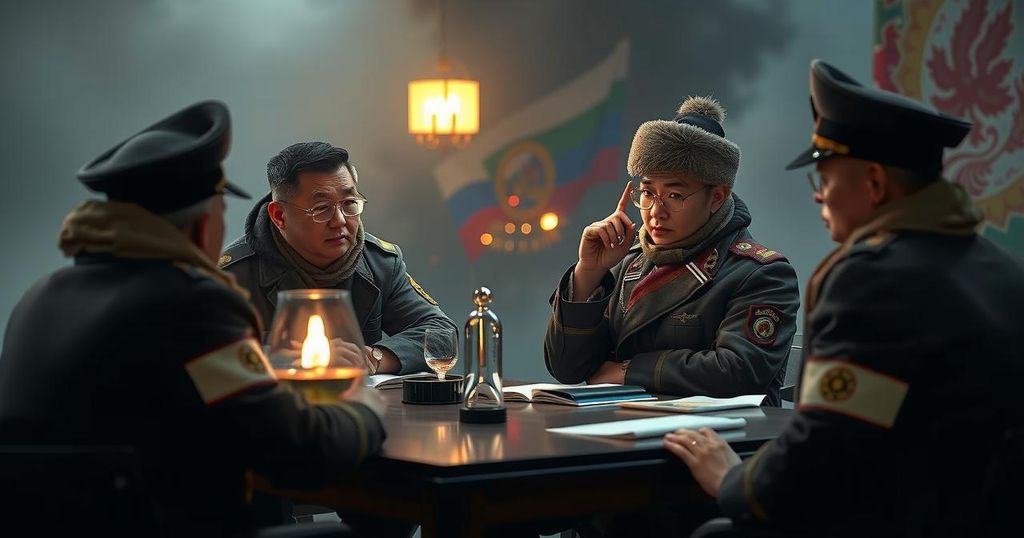World news
ASIA, CASUALTIES, CHINA, ENERGY INFRASTRUCTURE, EUROPE, EUROPE/ASIA, KOREA, SOUTH, KURSK, MARYNO, MEXICO, MILITARY, MISSILE ATTACK, NORTH, NORTH AMERICA, NORTH KOREA, PENTAGON PRESS SECRETARY, RFA, RFA KOREAN, RUSSIA, RUST, RUSTEM UMEROV, SEOUL, SOUTH KOREA, TAIPEI, TAIWAN, U. S, U. S. DEPARTMENT OF DEFENSE, UKRAINE, US, WAR, YO, YOON, YOON SUK YEOL
Daniel O'Connor
0 Comments
U.S. Confirms Casualties Among North Korean Troops in Russia’s Kursk Region
A U.S. official confirmed that North Korean troops in Russia’s Kursk region suffered casualties due to a Ukrainian airstrike. Reports indicate up to 500 may have been killed in an attack involving British missiles, and a high-ranking North Korean official was also reported dead. Diplomatic discussions are ongoing as Ukraine seeks support from South Korea amid rising tensions with Russia regarding military aid.
A United States official has confirmed that North Korean troops deployed in Russia’s Kursk region have sustained casualties due to a Ukrainian airstrike, marking the first acknowledgment from U.S. officials regarding North Korean losses. Reports previously indicated that approximately 500 North Koreans had died following a Ukrainian attack utilizing British Storm Shadow missiles, targeting a command center suspected of being used by North Korean and Russian military personnel.
Despite earlier statements by the Pentagon indicating an inability to confirm specific casualty figures, South Korean intelligence has reported that there is evidence North Korean forces in Russia experienced losses, although no precise numbers were provided. Pro-Russian accounts suggested that a significant missile strike occurred, resulting in substantial damage to the mentioned location.
The U.S. and South Korea both indicated that these North Korean soldiers had been engaged in combat operations against Ukrainian forces in the Kursk region since early August, with estimates suggesting the presence of over 10,000 troops. Notably, reports also noted the death of a high-ranking North Korean official during the attack, according to sources from the Wall Street Journal. Russia and North Korea have yet to confirm any information regarding the deployment or casualties of North Korean troops.
Meanwhile, Ukrainian diplomatic efforts are underway in South Korea, as Special Envoy Rustem Umerov and his delegation seek to gather support and information on the North Korean military involvement. President Yoon Suk Yeol has recognized the potential for a shift in South Korea’s stance regarding military aid to Ukraine in light of the developments with North Korean forces. However, this has drawn warnings from Russia regarding potential damage to bilateral relations if arms are supplied.
In summary, this development emphasizes the complex interplay of military involvement and geopolitical dynamics arising from the conflict, particularly concerning the roles of North Korea, Russia, and Ukraine.
This article focuses on the recent acknowledgment by a U.S. official regarding casualties among North Korean troops in the Kursk region of Russia. The incident follows reports of a Ukrainian airstrike that reportedly killed hundreds of North Korean soldiers who had been allegedly fighting alongside Russian forces against Ukrainian combatants. The strategic implications of North Korea’s involvement in the conflict raise concerns about the changing dynamics of military alliances and the responses of global powers to such developments, particularly in light of potential arms supplies from South Korea to Ukraine.
In conclusion, the confirmed casualties of North Korean troops in Russia underscore the escalating military engagement of North Korea in the Ukraine conflict, alongside Russian forces. The situation indicates a significant shift in regional dynamics and the implications of international military support. As diplomatic discussions continue, the potential for increased tensions between Russia and South Korea remains a pertinent concern as both nations navigate their respective strategic interests in the evolving conflict.
Original Source: www.rfa.org




Post Comment